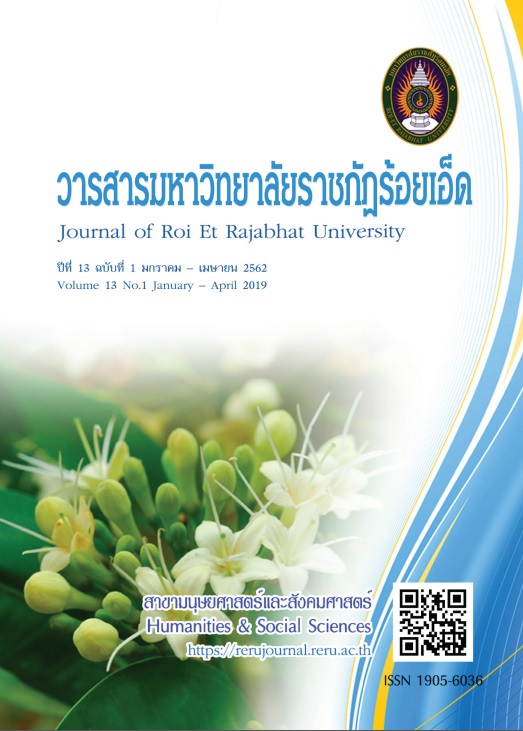The Development of a Program to Enhance Physical Education Teacher in Learning Process by Using Games for Schools under the Office of Mahasarakham Primary Educational Service Area 2
Keywords:
Teacher Development Program, Physical Education Learning Process, Physical GamesAbstract
This research aimed to 1) investigate the indicators of components of physical education learning process by using games, 2) study the current state and desirable state of physical education learning process by using games, 3) to study method for development teacher in physical education learning process by using games, 4) develop the program to enhance teachers. This research has 4 phases: 1) investigate the indicators and the components used the suitability assessment form assessed by 5 luminaries, 2) study the current state and desirable state used the current state form (discriminative power (rxy) 0.414 - 0.894 and reliability () 0.977) and desirable state form (discriminative power (rxy) 0.312-0.834 and reliability () 0.968), the samples were 230 physical teachers, 3) study method for development teacher used interview form, 9 keys informant were administrators and physical teachers of best practice schools, and 4) develop the program used suitability and possibility assessment form accessed by 5 luminaries. The descriptive statistics used in this research were average, standard deviation, and the piority need index (PNImodified). The research results were: The indicators of components of physical education learning process by using games including 12 components 45 indicators, the current conditions at the moderate level and the desirable conditions at the high level; the methods for teacher development applied to enhance the teacher program were training, practice, applied experiment, knowledge exchange and supervision on physical education learning process by using games; regarding the development to enhance teachers in physical education learning process by using games for schools under the office of Mahasarakham primary educational service area 2 program, the components of program were content, name of program, target, time to use, objective, plan/activity and program method/program media/program assessment, the luminaries were assessment program suitability and program possibility both at high levels.
References
จิราภรณ์ ศิริทวี. (2542). การเรียนการสอนวิทยาศาสตร์ที่เน้นนักเรียนเป็นศูนย์กลาง. กรุงเทพฯ: คอมแพคท์พริ๊นท์.
ชัชวาล รัตนพร. (2556). โปรแกรมการพัฒนาสมรรถนะการเป็นวิทยากรนันทนาการของนักศึกษาสถาบันการพลศึกษา กระทรวงการท่องเที่ยวและกีฬา. ดุษฎีนิพนธ์ การศึกษาดุษฎีบัณฑิต สาขาวิชาการบริหารและพัฒนาการศึกษา. มหาสารคาม: มหาวิทยาลัยมหาสารคาม.
ทองคูณ หงศ์พันธุ์. (2542). สอนดีต้องมีหลัก. กรุงเทพฯ: แสงสว่างการพิมพ์.
ธนานันต์ ดียิ่ง. (2556). โปรแกรมการพัฒนาสมรรถนะครูระดับการศึกษาขั้นพื้นฐานด้านการวัดและประเมินผลในชั้นเรียน. ดุษฎีนิพนธ์ ปรัชญาดุษฎีบัณฑิต สาขาวิชาหลักสูตรและการสอน. กรุงเทพฯ: มหาวิทยาลัยศิลปากร.
วณิช นิรันตรานนท์. (2552). รูปแบบการพัฒนาสมรรถนะครูผู้สอนกลุ่มสาระการเรียนรู้สุขศึกษาและพลศึกษาที่มีประสิทธิผลสำหรับโรงเรียนขนาดเล็กในเขตบริการของสำนักงานเขตพื้นที่การศึกษาอุดรธานี เขต 1. วิทยานิพนธ์ การศึกษามหาบัณฑิต สาขาวิชาการบริหารการศึกษา. มหาสารคาม: มหาวิทยาลัยมหาสารคาม.
วรศักดิ์ เพียรชอบ. (2548). หลักการพลศึกษา. กรุงเทพฯ: ศูนย์พัฒนาหนังสือ กรมวิชาการ.
ศรีวัย ศรีมณี. (2556). เกมและเกมนำ. กรุงเทพฯ: อาร์ ที พี พริ้นติ้ง.
สกาวรัตน์ นิลเพชร์พลอย. (2554). พฤติกรรมของผู้บริหารสถานศึกษาตามการรับรู้ของครู การศึกษาสภาพปัญหาการพัฒนาบุคลากรของโรงเรียนสังกัดเทศบาลเมืองในจังหวัดราชบุรี. วิทยานิพนธ์ ครุศาสตรมหาบัณฑิต สาขาวิชาการบริหารการศึกษา. ราชบุรี: มหาวิทยาลัยราชภัฎหมู่บ้านจอมบึง.
สกุล โสรัจจ์. (2539). เกม. มหาสารคาม: วิทยาลัยพลศึกษา จังหวัดมหาสารคาม.
สุวพร แสงรักษา. (2560). สภาพและปัญหาการสอนพลศึกษาในโรงเรียนประถมศึกษา สังกัดสำนักงานคณะกรรมการการประถมศึกษาแห่งชาติ. สืบค้นเมื่อ 20 มกราคม 2560, จาก www.researchgate.net
สำนักงานคณะกรรมการการศึกษาแห่งชาติ. (2552). ทศวรรษที่สองของการปฏิรูปการศึกษา. กรุงเทพฯ: สำนักงานคณะกรรมการการศึกษาแห่งชาติ.
Valantine, I. M., Dejan & Sporis, G. (2017). Effects of invasion games on physical fitness in primary school children. EQOL Journal, 9(1), 15-22.
Downloads
Published
How to Cite
Issue
Section
License
บทความที่ได้รับการตีพิมพ์เป็นลิขสิทธิ์ของวารสารมหาวิทยาลัยราชภัฎร้อยเอ็ด
ข้อความที่ปรากฏในบทความแต่ละเรื่องในวารสารวิชาการเล่มนี้เป็นความคิดเห็นส่วนตัวของผู้เขียนแต่ละท่านไม่เกี่ยวข้องกับมหาวิทยาลัยราชภัฎร้อยเอ็ด และคณาจารย์ท่านอื่นๆในมหาวิทยาลัยฯ แต่อย่างใด ความรับผิดชอบองค์ประกอบทั้งหมดของบทความแต่ละเรื่องเป็นของผู้เขียนแต่ละท่าน หากมีความผิดพลาดใดๆ ผู้เขียนแต่ละท่านจะรับผิดชอบบทความของตนเองแต่ผู้เดียว





